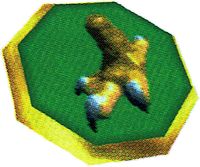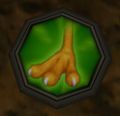Be sure to read our policy on citing sources before editing!
Difference between revisions of "Shock Spring Pad"
m (Results May Vary moved page Shock Jump Pad to Shock Spring Pad: manual name priority) |
(rewrite) |
||
| Line 1: | Line 1: | ||
{{Cleanup|Wikia}} | {{Cleanup|Wikia}} | ||
[[File:BK Shock Jump Pad art.png|thumb|200px|Artwork of a Shock Jump Pad from ''Banjo-Kazooie''.]] | [[File:BK Shock Jump Pad art.png|thumb|200px|Artwork of a Shock Jump Pad from ''Banjo-Kazooie''.]] | ||
'''Shock Spring Pads'''<ref>''Banjo-Tooie'' instruction booklet, page 23</ref><ref>''Banjo-Kazooie'' instruction booklet, page 22</ref>, also known as '''Shock Jump Pads'''<ref>''Banjo-Tooie'' Official Nintendo Player's Guide, page 14</ref><ref>''Banjo-Kazooie'' Official Nintendo Player's Guide, page 16</ref> and formerly '''Shock Jump Discs''', are green pads | '''Shock Spring Pads'''<ref>''Banjo-Tooie'' instruction booklet, page 23</ref><ref>''Banjo-Kazooie'' instruction booklet, page 22</ref>, also known as '''Shock Jump Pads'''<ref>''Banjo-Tooie'' Official Nintendo Player's Guide, page 14</ref><ref>''Banjo-Kazooie'' Official Nintendo Player's Guide, page 16</ref> and formerly '''Shock Jump Discs''', are green pads that aid [[Kazooie]] in using the [[Shock Jump Spring]] throughout the ''[[Banjo-Kazooie (series)|Banjo-Kazooie]]'' series. | ||
==History== | |||
===''Banjo-Kazooie''=== | |||
In ''[[Banjo-Kazooie]]'', [[Bottles]] teaches Kazooie how to use the Shock Jump Spring move in [[Treasure Trove Cove]], near the [[Sandcastle]], allowing her and [[Banjo]] to reach places high above the ground they couldn't before by holding the {{button|N64|A}} button. | |||
===''Banjo-Tooie''=== | |||
In ''[[Banjo-Tooie]]'', much like the other moves learned in ''Banjo-Kazooie'', Banjo and Kazooie already start the game knowing how to use the Shock Spring Pads. When [[Split-Up]], Kazooie jumps much higher with them, allowing her to access areas that her and Banjo together couldn't. | |||
In ''[[Banjo- | ===''Banjo-Kazooie: Grunty's Revenge''=== | ||
In ''[[Banjo-Kazooie: Grunty's Revenge]]'', [[Bozzeye]] teaches Banjo and Kazooie how to use Shock Spring Pads in [[Spiller's Harbor]]. It works much like in the other games, although there is no initial hop before the move is used. | |||
===''Super Smash Bros. Ultimate''=== | |||
In ''[[Super Smash Bros. Ultimate]]'', Shock Jump Pads appear when the duo use the Shock Spring Jump. If used midair, the pad will fall, and can land on opponents to damage them. After use, they will remain on the ground a little bit before disappearing , but can be picked up and thrown in that time. | In ''[[Super Smash Bros. Ultimate]]'', Shock Jump Pads appear when the duo use the Shock Spring Jump. If used midair, the pad will fall, and can land on opponents to damage them. After use, they will remain on the ground a little bit before disappearing , but can be picked up and thrown in that time. | ||
| Line 16: | Line 19: | ||
<gallery> | <gallery> | ||
Shock Jump Pad.jpg|In ''Banjo-Tooie'' | Shock Jump Pad.jpg|In ''Banjo-Tooie'' | ||
Shock-Spring Pad Grunty's Revenge.PNG|In ''Grunty's Revenge'' | Shock-Spring Pad Grunty's Revenge.PNG|In ''Banjo-Kazooie: Grunty's Revenge'' | ||
</gallery> | </gallery> | ||
Revision as of 11:52, January 4, 2021
This article requires cleanup in order to qualify for Jiggywikki's standards.
Reason: Wikia
You can discuss this issue on the talk page or edit this page to improve it.
Shock Spring Pads[1][2], also known as Shock Jump Pads[3][4] and formerly Shock Jump Discs, are green pads that aid Kazooie in using the Shock Jump Spring throughout the Banjo-Kazooie series.
History
Banjo-Kazooie
In Banjo-Kazooie, Bottles teaches Kazooie how to use the Shock Jump Spring move in Treasure Trove Cove, near the Sandcastle, allowing her and Banjo to reach places high above the ground they couldn't before by holding the button.
Banjo-Tooie
In Banjo-Tooie, much like the other moves learned in Banjo-Kazooie, Banjo and Kazooie already start the game knowing how to use the Shock Spring Pads. When Split-Up, Kazooie jumps much higher with them, allowing her to access areas that her and Banjo together couldn't.
Banjo-Kazooie: Grunty's Revenge
In Banjo-Kazooie: Grunty's Revenge, Bozzeye teaches Banjo and Kazooie how to use Shock Spring Pads in Spiller's Harbor. It works much like in the other games, although there is no initial hop before the move is used.
Super Smash Bros. Ultimate
In Super Smash Bros. Ultimate, Shock Jump Pads appear when the duo use the Shock Spring Jump. If used midair, the pad will fall, and can land on opponents to damage them. After use, they will remain on the ground a little bit before disappearing , but can be picked up and thrown in that time.


